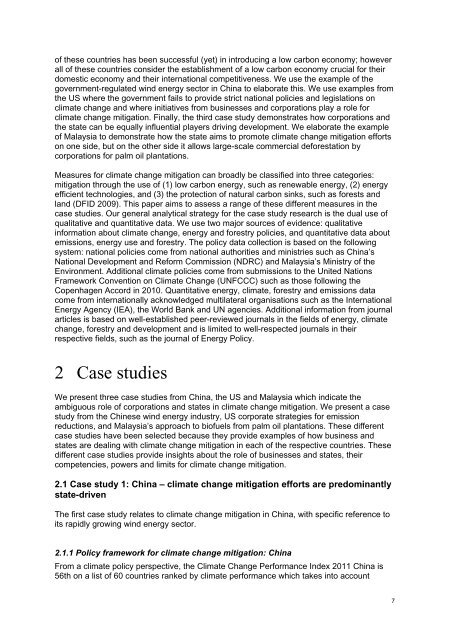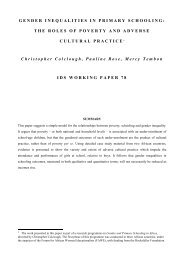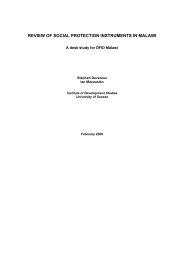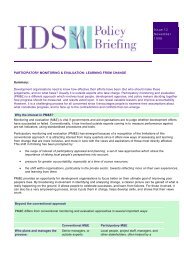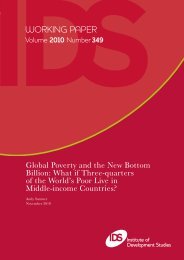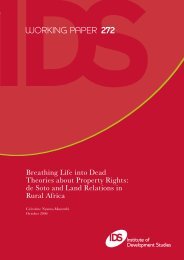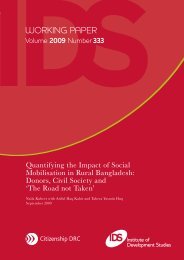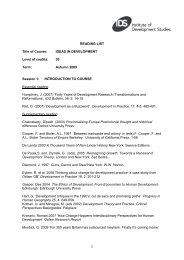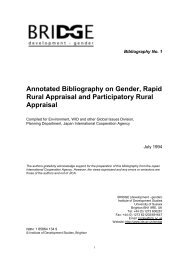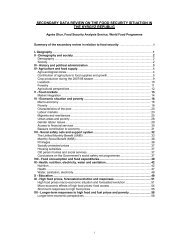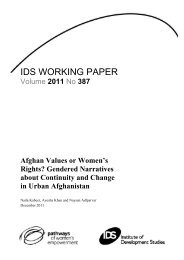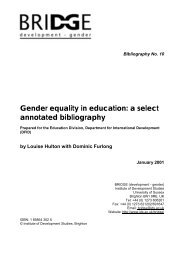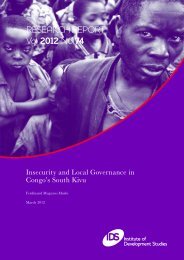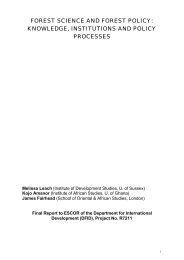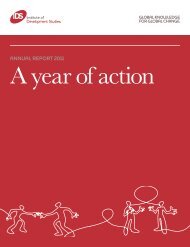IDS WORKING PAPER - Institute of Development Studies
IDS WORKING PAPER - Institute of Development Studies
IDS WORKING PAPER - Institute of Development Studies
Create successful ePaper yourself
Turn your PDF publications into a flip-book with our unique Google optimized e-Paper software.
<strong>of</strong> these countries has been successful (yet) in introducing a low carbon economy; however<br />
all <strong>of</strong> these countries consider the establishment <strong>of</strong> a low carbon economy crucial for their<br />
domestic economy and their international competitiveness. We use the example <strong>of</strong> the<br />
government-regulated wind energy sector in China to elaborate this. We use examples from<br />
the US where the government fails to provide strict national policies and legislations on<br />
climate change and where initiatives from businesses and corporations play a role for<br />
climate change mitigation. Finally, the third case study demonstrates how corporations and<br />
the state can be equally influential players driving development. We elaborate the example<br />
<strong>of</strong> Malaysia to demonstrate how the state aims to promote climate change mitigation efforts<br />
on one side, but on the other side it allows large-scale commercial deforestation by<br />
corporations for palm oil plantations.<br />
Measures for climate change mitigation can broadly be classified into three categories:<br />
mitigation through the use <strong>of</strong> (1) low carbon energy, such as renewable energy, (2) energy<br />
efficient technologies, and (3) the protection <strong>of</strong> natural carbon sinks, such as forests and<br />
land (DFID 2009). This paper aims to assess a range <strong>of</strong> these different measures in the<br />
case studies. Our general analytical strategy for the case study research is the dual use <strong>of</strong><br />
qualitative and quantitative data. We use two major sources <strong>of</strong> evidence: qualitative<br />
information about climate change, energy and forestry policies, and quantitative data about<br />
emissions, energy use and forestry. The policy data collection is based on the following<br />
system: national policies come from national authorities and ministries such as China’s<br />
National <strong>Development</strong> and Reform Commission (NDRC) and Malaysia’s Ministry <strong>of</strong> the<br />
Environment. Additional climate policies come from submissions to the United Nations<br />
Framework Convention on Climate Change (UNFCCC) such as those following the<br />
Copenhagen Accord in 2010. Quantitative energy, climate, forestry and emissions data<br />
come from internationally acknowledged multilateral organisations such as the International<br />
Energy Agency (IEA), the World Bank and UN agencies. Additional information from journal<br />
articles is based on well-established peer-reviewed journals in the fields <strong>of</strong> energy, climate<br />
change, forestry and development and is limited to well-respected journals in their<br />
respective fields, such as the journal <strong>of</strong> Energy Policy.<br />
2 Case studies<br />
We present three case studies from China, the US and Malaysia which indicate the<br />
ambiguous role <strong>of</strong> corporations and states in climate change mitigation. We present a case<br />
study from the Chinese wind energy industry, US corporate strategies for emission<br />
reductions, and Malaysia’s approach to bi<strong>of</strong>uels from palm oil plantations. These different<br />
case studies have been selected because they provide examples <strong>of</strong> how business and<br />
states are dealing with climate change mitigation in each <strong>of</strong> the respective countries. These<br />
different case studies provide insights about the role <strong>of</strong> businesses and states, their<br />
competencies, powers and limits for climate change mitigation.<br />
2.1 Case study 1: China – climate change mitigation efforts are predominantly<br />
state-driven<br />
The first case study relates to climate change mitigation in China, with specific reference to<br />
its rapidly growing wind energy sector.<br />
2.1.1 Policy framework for climate change mitigation: China<br />
From a climate policy perspective, the Climate Change Performance Index 2011 China is<br />
56th on a list <strong>of</strong> 60 countries ranked by climate performance which takes into account<br />
7


